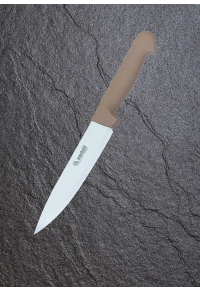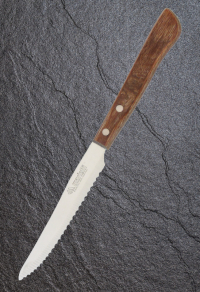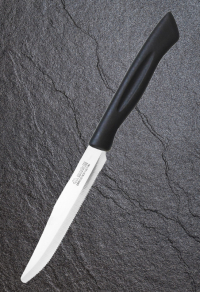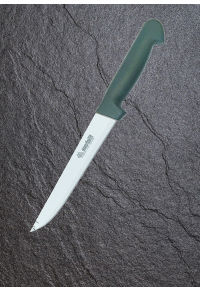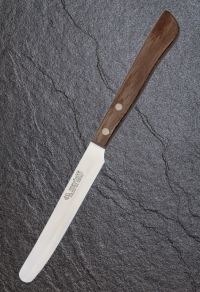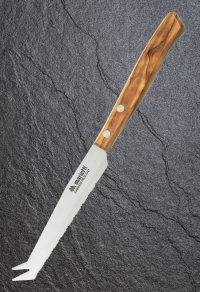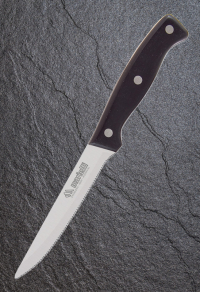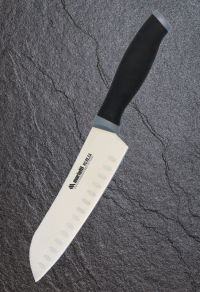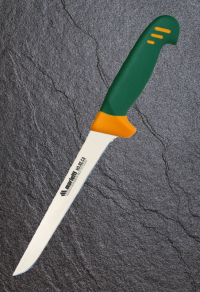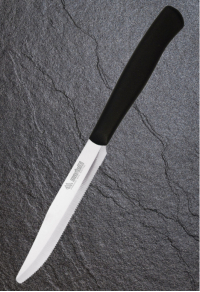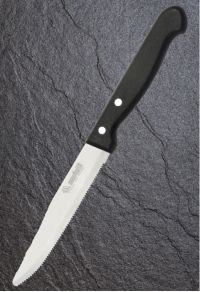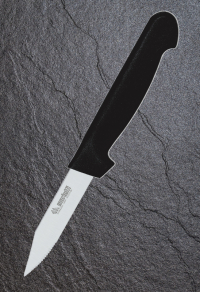Home
Subcategories
-
copy of Knife CUCINA -...
Together with the knife for vegetables it is probably the most used, as it can be used on a wide variety of foods and for a long series of operations. For example, it is able to chop, chop, reduce into cubes and slice meat, fish and vegetables.
-
Knife BISTECCA - cod. 713
It is the type of knife required for all red and white meats: especially steaks, chops, ribs and chops. Razor-sharp blades with teeth designed to crush the slices without damaging them.
-
Knife BISTECCA DENTATA 27TP
The type of serrated blade is suitable for cutting at best the fibers of the parts of hard and filamentous animals
Available colours:

-
copy of Knife DISOSSO -...
In the kitchen we often find ourselves working cuts of meat of different sizes and we need to separate the bones from the meat. DEBONING knives cater to this need: they can have a STRAIGHT or slightly CURVED blade to absorb the different types of cuts and shapes of the animals, making the preparation of the meat easier.
-
Knife TAVOLA - cod. 715
Suitable for all foods in general.
-
Knife FORMAGGIO
Cheese knife -
Knife BISTECCA - cod. 112FT
It is the type of knife required for all red and white meats: especially steaks, chops, ribs and chops. Razor-sharp blades with teeth designed to crush the slices without damaging them.
-
Knife SANTOKU 1235TP
A Santoku has a blade quite similar to a carving knife and is the Japanese equivalent of a chef's knife. Since it is a good idea to have a knife (and a cutting board) for raw food and a knife (and a cutting board) for cooked foods, the second carving knife can be a Santoku so you have the chance to try this type of blade too. The big difference between the two blades is that the carving knife is designed so that the tip always remains in contact with the cutting board, while the Santoku is used as a small cleaver and the tip always comes off the cutting board.
-
Knife DISOSSO 18 BON18
In the kitchen we often find ourselves working cuts of meat of different sizes and we need to separate the bones from the meat. DEBONING knives cater to this need: they can have a STRAIGHT or slightly CURVED blade to absorb the different types of cuts and shapes of the animals, making the preparation of the meat easier.
-
Knife BISTECCA DENTATA...
It is the type of knife required for all red and white meats: especially steaks, chops, ribs and chops. Razor-sharp blades with teeth designed to crush the slices without damaging them.
Available colors:
-
Knife BISTECCA RIVETTATA...
It is the type of knife required for all red and white meats: especially steaks, chops, ribs and chops. Razor-sharp blades with teeth designed to crush the slices without damaging them.
Available colors:
-
Knife SBUCCIATORE - cod. 67A
A short and handy blade, slightly curved. It allows processing outside the cutting board such as the cleaning of large vegetables, the making of small decorations and the peeling of some vegetables. A good paring knife will really serve every day and it is necessary that it is comfortable and very well sharpened. The blade will have to cut without the need to apply pressure, because if you press it it will end up cutting your fingertips sooner or later. The blade may not even be curved but straight, but the preference falls for years on the curved one. This is also the peeler called VEG.


